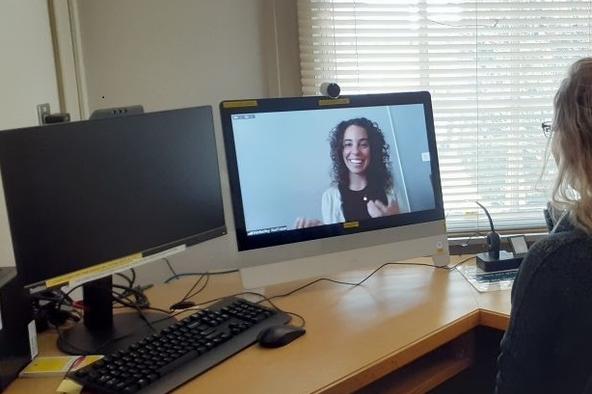Virtual health at the Red Fish Healing Centre expands care possibilities across B.C.

The new, 105-bed facility, opening in September 2021 in Coquitlam, is designed specifically for patients and clients with the most complex mental health and addictions challenges in B.C. Being a provincial facility means caring for people from all corners of the province – but it can be difficult for some clients who are unstable or in distress to immediately travel all the way to the Lower Mainland for care.
That’s where virtual technology comes in.
Meeting clients where they are
“Virtual technology such as videoconferencing helps us connect with clients, regardless of where they are, and close the care gap,” said Dr. Nickie Mathew, the medical director for the Red Fish Healing Centre for Mental Health and Addiction. “We’re not thinking of virtual care as a replacement for in-person care, but as a creative way to expand our reach and capacity in ways we didn’t think possible 10 years ago.”
Even when distance isn’t an issue, virtual care is sometimes preferable to in-person care — and not just during a pandemic. Moving to a new care setting can be stressful and risky for a client who lives with complex mental health and substance use challenges.
“In some cases, clients who need specialized treatment are asked to move to another site or setting for a consultation or appointment. Being able to participate in a virtual clinic instead can reduce the trauma or anxiety associated with having to leave a familiar setting,” says Kimberly Korf-Uzan, the director of e-mental health and special projects at BC Mental Health and Substance Use Services.
“Having that treatment take place in a comfortable, familiar environment often feels more secure for them.”

Ensuring truly seamless care
One of the challenges of providing very specialized care at a facility such as the Red Fish Healing Centre is a lack of specialized follow-up care when clients return home.

“What we’ve noticed is that clients get better while they’re here, but when they go back to their home community, they might not have as many resources or support services,” says Dr. Mathew. “They might start decompensating, which refers to a deterioration in their mental state.”
Thanks to virtual care tools, care providers at the Red Fish Healing Centre will support clients and their community care providers during their transition home to ensure they don’t fall through the cracks.
“Let’s say we have a client who is going home after completing the program,” says Korf-Uzan. “Both onsite and offsite staff, community team members outside of the facility, family, and the client can participate in a virtual care-planning meeting to support a successful transition back to the client’s home community and local care team.
"We want to ensure that clients and patients are fully supported to stay on their recovery journeys after they leave us.”

Connecting with loved ones: A vital part of healing
Enhanced care before, during and after the Red Fish Healing Centre is just the beginning.
“As we’ve learned during the pandemic, connecting with the people we care about is vital to our well-being,” said Dr. Jane Sun, a director of interprofessional practice at BC Mental Health and Substance Use Services.
“We know that outcomes are better for clients whose loved ones are involved in their care planning, and who can stay connected during treatment. But that isn’t easy for clients who have travelled from another part of the province. Robust virtual technology will help make that face-to-face connection possible.”
This past year, when visitors to inpatient facilities were restricted, many BC Mental Health and Substance Use Services clients were able to connect with loved ones using iPads, and according to Korf-Uzan, the practice will continue after the pandemic is over — it means that even clients whose families live far from the Red Fish Healing Centre will get visits.
“It’s not the same as having someone there in person,” she said. “But for those who weren’t getting any visits at all, it’s a big change and bonus for them.”
Building capacity across B.C.
Perhaps the most exciting component of the potential of virtual care for Dr. Vijay Seethapathy, BC Mental Health and Substance Use Services’ chief medical officer, is the potential for capacity-building in other parts of B.C.
"Now more than ever, in the midst of two public health emergencies, expanding our reach and services is vital — and that’s exactly what virtual care is helping us do." - Dr. Vijay Seethapathy
Like most BC Mental Health and Substance Use Services facilities, the Red Fish Healing Centre for Mental Health and Addiction will require a referral. The facility’s 105 beds will be reserved for those who truly need them most.
But through virtual technology, staff, physicians and researchers at the centre will be able to engage in knowledge transfer with care providers and patients across the province.

“We’re envisioning a hub and spoke model, where the Red Fish Healing Centre is the hub, and community support services are the spokes,” said Dr. Seethapathy. “Care providers everywhere in B.C., even in rural, remote areas, will be able to consult with leading experts in concurrent disorders without having to get on a plane. This means improving the standard and breadth of care for everyone in B.C. who needs it, regardless of where they are or how many beds we have. Now more than ever, in the midst of two public health emergencies, expanding our reach and services is vital — and that’s exactly what virtual care is helping us do.”